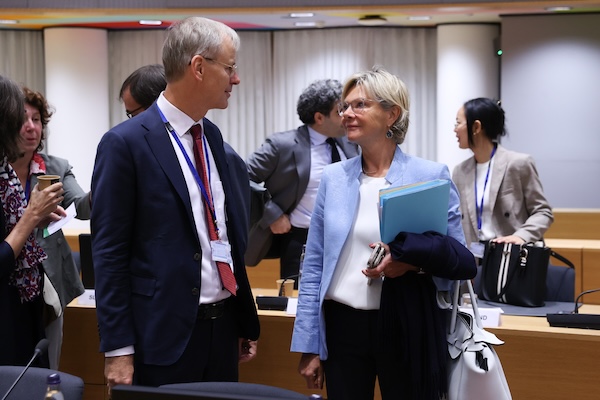 (L-R Marten) Van Den Berg, Deputy Minister of Agriculture of the Kingdom of the Netherlands; Martine Hansen, Luxembourg Ministry of Agriculture, Food and Viticulture;
Credit: European Union Council
(L-R Marten) Van Den Berg, Deputy Minister of Agriculture of the Kingdom of the Netherlands; Martine Hansen, Luxembourg Ministry of Agriculture, Food and Viticulture;
Credit: European Union Council
On Tuesday 23 September 2025, Luxembourg’s Ministry of Agriculture, Food and Viticulture reported that Martine Hansen, Minister of Agriculture, Food and Viticulture, participated in the European Union Council on Agriculture and Fisheries, which took place in Brussels on Monday 22 and Tuesday 23 September 2025.
According to the ministry, during discussions on the post-2027 Common Agricultural Policy (CAP), Minister Hansen emphasised that agriculture is a strategic sector requiring an autonomous CAP with a dedicated budget. She said: "We share the vision of a future CAP with ‘fewer rules and more incentives’, but this is difficult to achieve with a smaller budget. Farmers have asked for simplifications: conditionality obligations must be reduced, and redundant requirements removed. Member States should have more subsidiarity to manage programmes according to the socio-economic context of their agriculture.”
Minister Hansen added: “Investment subsidies for the processing sector and rural development aid must be maintained to ensure food sovereignty and secure the future of our supply chains. I regret that school fruit and milk distribution programmes no longer have a dedicated allocation within the CAP.”
Minister Hansen welcomed the European Commission’s plans to develop a generational renewal strategy and a starter kit for young farmers, while calling for CAP-related elements to be consolidated into a single text to avoid fragmentation. She also stressed that key legislative elements relating to the CAP must be negotiated within the Council of Agriculture Ministers.
Minister Hansen also underlined that fair conditions and reciprocity in trade agreements between the EU and third countries are vital for both farmers and consumers. She also proposed simplifying and postponing the deforestation regulation to relieve farmers in regions with minimal deforestation from unnecessary administrative requirements. This initiative, supported by seventeen other European agriculture ministers, was presented at the Council and through a letter to the President of the European Commission. During a meeting with European Commissioner for the Environment Jessika Roswall, the Commissioner agreed to postpone implementation of the regulation by one year. The minister also requested that producers in low-risk areas be exempt from geolocation requirements, and the Commissioner will use the additional year to consult stakeholders and implement practical simplifications.
The ministry also reported that in discussions with Commissioner for Health and Animal Welfare Olivér Várhelyi, Minister Hansen addressed coordinated action against animal diseases, urging the Commission to centralise vaccine stocks at European level or organise joint purchases to respond rapidly to outbreaks. The Commissioner committed to making vaccines quickly available to all affected countries.
Moreover, the talks also covered pesticide residue tolerances in imported food. To ensure fair conditions for farmers and protect consumers, the EU cannot allow food containing unauthorised residues for health reasons on the market. The Commissioner plans to enforce a zero-tolerance approach through the simplification package, scheduled for publication at the end of 2025.








